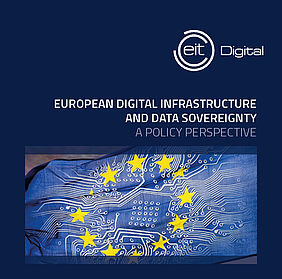New report on European digital infrastructure and data sovereignty

A Policy Perspective.
In this brand-new Policy Perspective report, EIT Digital provides an overview of policy motivations, trends, instruments and the roles of various actors in defining the perception of and perspectives for Europe’s digital sovereignty. The report offers regulators a concrete scenario-based framework for digital policy development.
As a bold conclusion, through coordinated action between European Commission and EU Member States, Europe is called upon to better connect makers (industry) and shapers (authorities, citizens) to create the right policy instruments for a sovereign European digital reality with innovation and regulation that respect European values and rights while creating equal economic opportunity for all actors.
Recent discussions around 5G and COVID-19 contact tracing amplify the need for European sovereignty when it comes to digital infrastructures and the handling of data. This report provides an overview of policy motivations, trends, instruments and the role of various actors that jointly create the digital reality. With the aim to develop policies that will contribute to a stronger European sovereignty when it comes to digital infrastructures and handling of data, a scenario-based framework representing policy choices is introduced that allows the assessment of these scenarios with respect to policy objectives.
It is important to recognise that digital infrastructure control and data regulation are complementary and can be combined in various ways. Thus, the framework contains four different scenarios derived from combining opposite approaches with respect to infrastructure control and data regulation. The scenarios are then assessed with respect to their impact on the policy objectives growth, fairness, innovation potential, citizens trust, and level playing field. The impact assessment serves as a high-level guidance for concrete policy development, and as such it provides an important tool for the development of digital infrastructure and data policy instruments.
European Digital sovereignty - conclusions and recommendations
As stated, the European struggle with COVID-19 contact tracing apps has once more illustrated the importance of European digital sovereignty. The objective of this report is to provide a concise scenario-based framework together with an impact analysis as an instrument for the development of a policy strategy to achieve such sovereignty. Given the current state of affairs and the different views on the complex task of developing policies with many stakeholders and many different interests, bringing the key ingredients together in an orderly and concise framework is urgently needed.
There is currently a vicious cycle in which a very small number of (non-EU) companies have oligopolistic access to valuable user data. The more data they access, the faster the improvement of their algorithms that create value added products from these data, the higher the penetration of these products into world markets and the greater the generation of new valuable data that feed the cycle. This cycle forms a barrier to European innovation and growth, constitutes a serious threat to European sovereignty and needs to be slowed down and eventually broken via novel, agile regulatory tools.
The analysis shows that long term consistent growth is best achieved in scenarios where interests of the various stakeholders are balanced, and the rights of citizens and businesses are protected through a combination of regulation and dynamic interaction of the stakeholders. Infrastructure control is either hands-off or implemented via regulation rather than ownership. Data ownership and access control is implemented through data governance policies concerning both private and industrial data.
Europe, through coordinated action between the European Commission and EU Member States, is called upon to use this framework to virtuously connect makers (industry) and shapers (authorities, citizens) in order to create a sovereign European digital reality with innovation and regulation that respect European values and rights while creating equal economic opportunity for all actors. A dynamic, balanced and proportionate regulatory approach is required to strive towards optimal conditions for innovation with equitable access to economic opportunity in a trusted digital world. Such an approach will create a more level playing field that enables new industry players (including European) to enter and diminish the dependency of citizens and governments on oligopolistic industry actors.


 Share this page
Share this page


